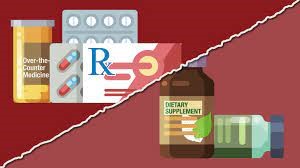In today’s health-conscious world, the popularity of dietary supplements has skyrocketed. Walk into any pharmacy, supermarket or health food store, and you’ll find shelves filled with an array of these. Supplement recommendations are also found everywhere — on commercials, through social media influencers, and from your neighbors, friends, and family.
People take food supplements for all kinds of reasons, usually relating to their health. They hope for the boost in immunity, improved physical performance, anti-ageing, longevity, reduced risk of chronic disease, treatment of specific ailments such as arthritis or improved general health and wellbeing.
However, it’s important to question whether we truly need to rely on a multitude of daily supplements. Are they essential for everyone, or is it possible to obtain optimal nutrition through a well-balanced diet alone? Let’s explore the topic and shed light on whether supplementation is necessary or potentially harmful.
What is a Dietary Supplement?
As the name implies, dietary supplements include any consumed products that aim to supplement the diet and provide additional nutrients that may be missing or aren’t being consumed in sufficient quantities. It can include vitamins, minerals, an amino acid, essential fatty acids, fiber or various plants and herbal extracts either singly or in combination. They also come in a variety of forms, including traditional tablets, capsules, powders, drinks, and supplement bars.
The Power of a Balanced Diet

It is crucial to understand that the foundation of good health lies in a well-balanced diet. A diet consisting of whole foods, including fruits, vegetables, whole grains, lean proteins, and healthy fats, provides a wide range of nutrients essential for our body to function optimally. These nutrients include vitamins, minerals, fiber, and antioxidants that work synergistically to promote overall well-being and reduce the risk of chronic diseases.
Supplements as a Safety Net
While a balanced diet should be our primary source of nutrients, certain situations may warrant the need for supplements. For example, individuals with specific dietary restrictions, such as vegans, vegetarians or those with food allergies, may benefit from targeted supplementation to address potential nutrient deficiencies. Additionally, some populations, such as pregnant women or older adults may require supplements due to increased nutrient needs or impaired absorption. For example, women trying to conceive and those in the first 12 weeks of their pregnancy are recommended to take folic acid supplement to reduce the risk of birth defects of brain and spine. Likewise, iron supplements during pregnancy can substantially reduce the risk of anemia and perinatal complications in mothers. People who are not exposed to much sun may require vitamin D supplement. Vegans and strict vegetarians should ensure adequate intake of vitamin B12 from supplements as it is found only in foods of animal origin. Physician-recommended treatment of disorders such as osteoporosis as well as other diseases, may require use of vitamin and /or mineral supplement. Those with health conditions that affect digestion, appetite, and limit nutrient absorption, may not be receiving adequate nutrients from diet alone and may need a multivitamin and/or multimineral supplement in consultation with a professional.
Nutrient Interaction
Certain nutrients (present in food / supplement) interact with one another and affect their absorption in a positive or negative way. For example, minerals like calcium can inhibit iron absorption and hence they should be dosed at different times of the day. Vit C helps in the absorption of iron and should be taken together. Taking a vitamin B12 supplement with a vitamin C supplement can reduce the amount of vitamin B12 in the body. It’s best to take the vitamin C supplement two or more hours after taking a vitamin B12 supplement.
Taking More Isn’t Necessarily Better
When it comes to vitamins and minerals, some people subscribe to the notion that if little is good, then more is better. Over-supplementation can lead to nutrient imbalances or toxicities. No doubt, calcium is important for bone health, but taking excess calcium supplement can increase the risk of buildup of plaque in your arteries. High doses of iron can lead to stomach upset, constipation, vomiting, and fainting. Iron can also limit the body’s ability to absorb zinc. Very high doses of vitamins A, D, C, and B6 supplement can cause serious health problems, if taken regularly. Smokers should avoid multivitamins with large amounts of beta carotene or vitamin A, as these excess nutrients may increase the risk of lung cancer. Water-soluble vitamins are commonly thought of as harmless, however, research shows that high doses of vitamin B-6 supplement can cause loss of feeling in the arms and legs due to nerve damage. High intakes of folic acid can mask or worsen the symptoms associated with a vitamin B-12 deficiency. Taking black tea or green tea with lemon (rich in vitamin C) to boost immunity may have an adverse effect on the kidney, in people with kidney stones. The body converts vitamin C into oxalates which is normally thrown out of kidneys. But in people who have a tendency to form kidney stones, oxalates get deposited in the kidney and thus may affect its functioning.
Interference with Certain Medications

Supplements may interact with other medications you’re taking or pose risks if you have certain medical condition, such as liver disease, or are going in for a surgery. For example, Vitamin K & E can interfere with warfarin, a blood thinning medication. Omega-3 supplements may interact with some medicines that control high blood pressure. Iron and calcium supplements can interfere with the absorption of medicine for hypothyroidism. People taking iron supplements or multivitamins that contain iron should avoid taking their supplement within two hours of a dose of tetracycline or fluoroquinolone antibiotic.
Quality Control

Another important consideration when it comes to supplements is quality control. The supplement industry is not as strictly regulated as the pharmaceutical industry, and the quality and effectiveness of products can vary significantly. Some supplements may not contain the ingredients they claim, or they may be contaminated with harmful substances. Also, just because some supplements are marketed as “natural”, they may not be safe.
The Role of Individualization
One size does not fit all when it comes to nutritional needs. Each person’s physiology, lifestyle, and health status are unique. Therefore, blanket recommendations for supplements may not be appropriate for everyone. Consultation with a dietitian or doctor can help assess your specific needs, considering factors such as age, gender, medical conditions and dietary habits. They can provide personalized guidance on whether supplementation is necessary and which supplement would be most beneficial.
While dietary supplements can have a place in supporting overall health, they should not be seen as a substitute for a well-balanced diet. Supplements lack the synergistic effect of whole foods, which provide a wide range of nutrients, fiber, and other beneficial compounds that work together to promote health. However, there are instances where targeted supplementation may be necessary or beneficial, such as in the case of specific dietary restrictions or increased nutrient requirement. Ultimately, the decision to take supplements should be made on an individual basis, with guidance from qualified professionals, to ensure safety and efficacy. Remember, when it comes to nutrition, balance and individualization are key.
Takeaways
- Before starting any supplement regimen, it’s crucial to talk to a professional. They can assess your individual health status, review your medical and diet history, and advise you on whether the supplement is needed.
- They would check the natural food sources of the nutrient/s needed. In case sufficient quantities of the same cannot be obtained from the diet, then supplement may be suggested.
- Understand its intended benefits, potential risks, side effects, and recommended dosage.
- Choose the supplement from a reputable brand or manufacturer.
- Follow the recommended dosage instructions provided on the supplement’s packaging or by the professional. Avoid taking more than the recommended dose, as it can lead to adverse effects.
- Some supplements may interact with prescription medications you are currently taking, reducing their effectiveness or causing harmful effects. Inform your healthcare provider about all medications and supplements you are using to prevent potential interactions.
- Certain health conditions may be worsened by taking specific supplements. For example, some supplements may negatively impact liver or kidney function. Inform your healthcare provider about any pre-existing medical conditions you have to avoid potential complications.
- If you are pregnant or breastfeeding, consult with your healthcare provider before taking any supplements, as some may not be safe during these periods.
- Consider whether the supplement is intended for short-term or long-term use. Some supplements may not be suitable for extended periods due to potential side effects or interactions.
- Understand the possible side effects associated with the supplement. While many over the counter supplements are generally safe, some individuals may experience adverse reactions.



